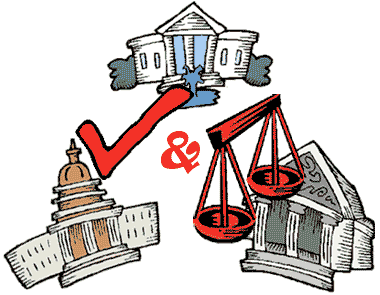 I'm due for my annual letters to Congress and find myself woefully unable to draft such a piece. It's obviously not for lack of issues or motivation. I must fess up that it's mostly because I've been too busy to follow close enough to know what to say. Although surely preparedness is not a prerequisite for engaging with your elected officials on a regular basis on whatever you want.
I'm due for my annual letters to Congress and find myself woefully unable to draft such a piece. It's obviously not for lack of issues or motivation. I must fess up that it's mostly because I've been too busy to follow close enough to know what to say. Although surely preparedness is not a prerequisite for engaging with your elected officials on a regular basis on whatever you want.I do have to say, which is the motivation behind today's post, that some of it is an uncertainty about the role of Congress in our modern tripartite system of government. It is my understanding that our Founding Fathers, even in ensuring our hallowed sense of checks and balances, imbued particular authority in our legislative branch. They were after all deeply distrustful of power concentrations, and so rather than an all-powerful singular executive or a judiciary group with lifetime appointments, they figured our best bet at governance lay in a popularly elected legislative body.
Perhaps I am showing my political cards in describing it this way, but to me this makes sense. The president ought to set the agenda for the nation, and it's his (or her) job to get that agenda sold, executed, and delivered, but it is patently obvious that such power must be checked. The judiciary branch's job is not to legislate or execute, and if they did we are in trouble because there is no accountability mechanism like there is with the other two branches of government to "vote the bums out."
Which leaves our Congressional representatives. Many have presidential aspirations, and seem to have renounced their present role of legislating in order to audition for the future office they seek by grandstanding or worse. (Btw, here I am decidedly not speaking of Democratic wunderkind Alexandria Ocasio-Cortez, many of whose political positions I disagree with but I have been impressed with her not only being a good communicator but also appearing to be savvy as to what actual levers of governance power she has as an incoming legislator. In other words, she is making a good transition from running for office to being in office.)
But can we blame our elected officials in Capitol Hill? We are the ones who could tell you all about what they said at the Kavanaugh confirmation hearings but couldn't name one piece of legislation they drafted. When we the people don't think of Congress as anything but a rehearsal for the executive branch or the approval process for the judiciary branch, why would the people we elect act any other way? Our highest emotions appear to be reserved solely for our president's policies or what
Supreme Court composition will mean for the country our kids will live in, when in fact the way things were set up it was the people we elect every two or six years that were supposed to have the biggest influence on the direction of our nation. (Go back to my complimentary words for Congresswoman Ocasio-Cortez, and consider how much we have elevated elections rather than governance, to the point that our electeds spend more time running for office than actually fulfilling the role for which they are running.)
There are deep divides in America right now. I am glad to have a diverse group of friends in many ways, including political persuasion. I am glad we have been able to voice our disagreements, even vehemently, while respecting each other. We have much work to do, and the future of our great country is not guaranteed, so let's continue to speak up. But my question today is not where our elected officials on the issues we care about. My question is, are our elected officials in Congress even doing the job they are supposed to do in our system of government? Is our hallowed system of checks and balances fundamentally distorted to the point of no return, and if so shouldn't that worry us more than any particular person or party's agenda? I say this as someone who is deeply troubled by the behavior, rhetoric, and mindset of the person occupying the Oval, and is deeply dissatisfied with the approaches and actions of legislators on both sides of the aisle. And yet this fundamental breakdown in how our government system is supposed to work is the most disconcerting thing to me, especially given how little attention seems devoted to this. I welcome your thoughts on this.


No comments:
Post a Comment